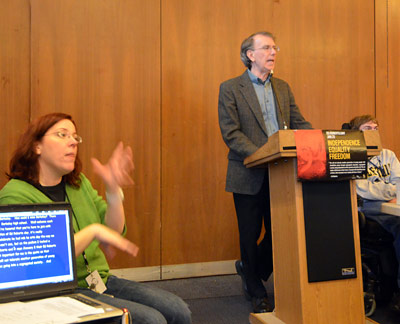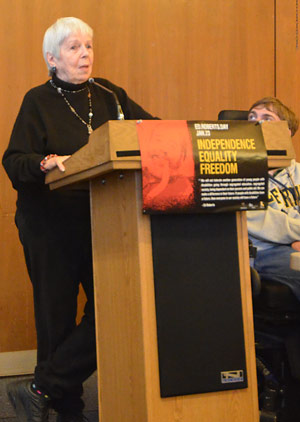Community celebrates Ed Roberts Day
On Jan. 23, the campus honored the father of the independent-living movement, Ed Roberts, during an outreach event for local high-school students with special needs.
January 24, 2012
Know your options. Develop a plan. Face your fears head-on. That was the “roadmap to success” message laid out for the wide-eyed local high-schoolers who visited the campus as part of this year’s Ed Roberts Day celebrations.
Alumni House welcomed some 60 students with disabilities from high schools in Albany, Berkeley, Oakland and Richmond for Monday’s outreach event, which explored the challenges and possibilities facing would-be college freshmen with special needs.

DSP Director Paul Hippolitus led the celebration of Berkeley alum and disability-rights pioneer Ed Roberts. (Roibín Ó hÉochaidh photo)
Develop your self-confidence, start trying new things on for size and don’t let those negative voices hold you back, said Paul Hippolitus, director of Berkeley’s Disabled Students Program. DSP co-sponsored the event in conjunction with the Berkeley Center for Independent Living to remember, celebrate and advance the work of disability-rights trailblazer Ed Roberts.
Roberts, who died in 1995, became the first student with severe disabilities to attend Berkeley when he arrived on campus with his wheelchair and 800-pound “iron lung” in 1962.
In 1972, he co-founded the Center for Independent Living, a nonprofit advocacy group for people with disabilities and special needs, and is recognized, nationally and internationally, as the father of the independent-living movement.
State Sen. Loni Hancock was instrumental in enacting the 2010 legislation that designated Jan. 23 as a day to honor the disability-rights movement pioneer.
“Ed Roberts Day is a day of special significance in California to remind people of the great journey that was begun here in the East Bay, and that spread around the world and is enlarging the sense of possibility for so many millions of people with disabilities every single day,” said Hancock, whose district includes the Berkeley campus.

Zona Roberts recalled 1960s newspaper headlines that proclaimed her son a "helpless cripple." (Roibín Ó hÉochaidh photo)
The Disabled Students Program at Berkeley now serves roughly 1,100 students with all kinds of disabilities, and last year, the campus launched a groundbreaking disability-research initiative.
“Berkeley wasn’t as friendly to students with disabilities when Ed came here, but we learned from him, he helped us, and the lessons we learned from him live on today in our Disabled Students Program,” said Gibor Basri, Berkeley’s vice chancellor for equity and inclusion.
Housed in the Haas Diversity Research Center, the new multidisciplinary research effort, which involves 10 faculty members from eight campus units, will focus on such critical issues as how people define and respond to disability across the areas of technology, education and employment.
“We have set something of a national standard in the support and services that we offer here, and we want to stay on the cutting edge of this area,” Basri said.
Disability advocates and Berkeley faculty and staff offered up insight, resources and words of encouragement during Monday’s event, before treating the visiting high-school students to a campus tour that drenched umbrellas and whetted appetites in equal measure.
“I’m new to this community, having lost my sight four years ago,” said Christopher Downey, a lecturer in Berkeley’s College of Environmental Design. “Being an architect, contrary to what a lot of people think, I found it to be more exciting and more engaging than it was for me sighted.
“Turning tables and setting new expectations, and finding really wonderful things in very different, unexpected circumstances, that’s one of the things I’ve come to appreciate in this experience and it’s an important thing to think about going forward in your education,” Downey said.

Teacher Jana Luft accompanied students from Berkeley High School. (Roibín Ó hÉochaidh photo)
Mark Burns, deputy director of the Center for Independent Living, announced the introduction of a new a peer mentoring program that will match Alameda County high-school students with college undergraduates.
The program will allow participating students to engage with college mentors in a range of one-on-one activities designed to help the high-school students gain a better understanding of life as a college student. CIL will provide additional information about the program through its website in February and plans to hold outreach events around the county in coming months.
“Events like this are great because students have the opportunity to see that college is accessible and a real possibility,” said Berkeley High School teacher Jana Luft. “It gives them the chance to visit the campus and meet people, and to ask questions about college life and studying at Berkeley.”